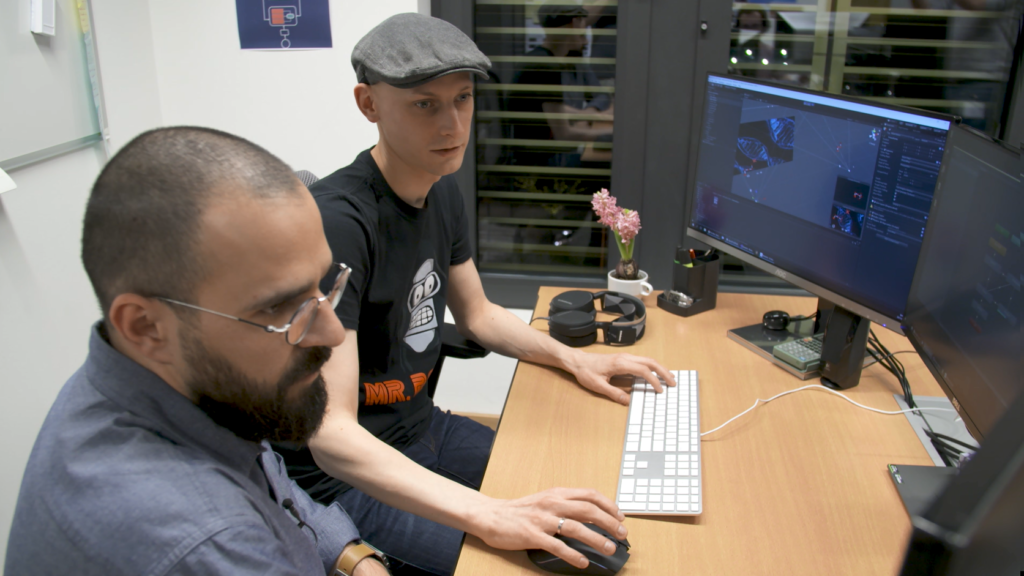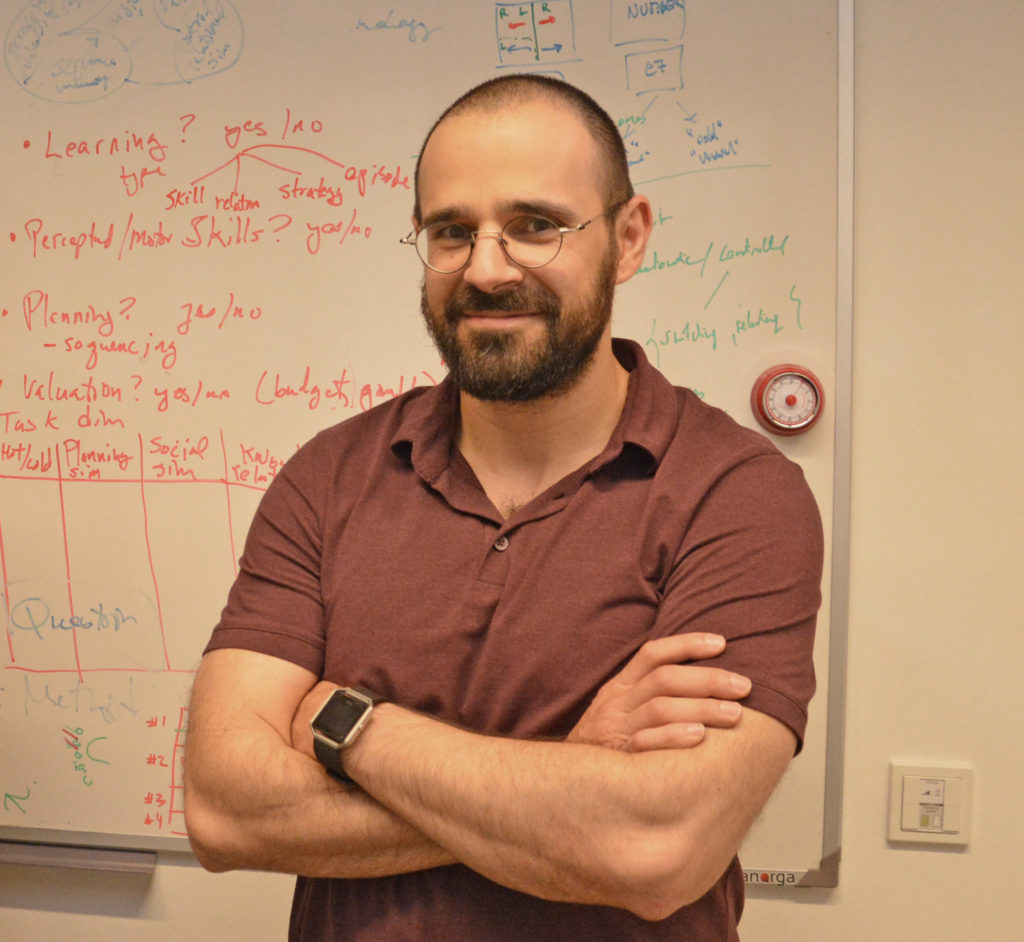BACK TO RESEARCH WITH IMPACT: FNR HIGHLIGHTS
BACK TO RESEARCH WITH IMPACT: FNR HIGHLIGHTS

With his research group, Assistant Prof Dr Pedro Cardoso-Leite combines experimental psychology with video games, in an effort to understand how our mind works, and how this knowledge can be leveraged to improve learning. We spoke to the Portuguese-Luxembourg bi-national about his return to Luxembourg after almost two decades, what he wants to achieve in the next five years, and how his interdisciplinary team is broadening his horizon.
Your field is experimental psychology and you work with technology and video games. Can you explain a bit about how you combine the two, and how this came to be? Was this something you always wanted to do?
“Experimental psychology is about conducting experiments to better understand how the mind works. There are different aspects to the mind – such as emotions and memories – my interest lies in cognitive abilities: what we are able to compute, understand and perform.
“In recent years it has become clear to me that video games can be invaluable for experimental psychology.”
In which way?
“Firstly, games can be used as a training tool. For example, research led by Daphne Bavelier, the leader of my former research group, has shown that games can influence your cognitive abilities.
“Playing regularly certain types of games can improve how well you pay attention to things around you. Unfortunately, those same types of games tend to be violent, and were designed mainly for young males and are thus typically inadequate for a broader population, including for example older people, or children. A lot of work is needed to understand those mechanisms underlying those effects and to create games that could be used as interventions for the general population.
“The second reason why games are interesting is because they can be used as a research tool and a platform to facilitate the collection of large amounts of data, which are critical to both study complex phenomena, and account for the large individual differences that are typically observed across people.
“Collecting this type of data via traditional means—that is by inviting people to come for testing in the lab—is not a viable option. Many people spend a significant amount of time playing games anyway – most people frequently play some kind of game on their phone. Exploiting this to conduct research is I think a method that will become more and more relevant.”


Combining psychology research with creating video games must be a fairly new approach – are you aware of many other researchers doing this kind of work?
“There are a few other labs—but it’s really hard to do this well because you need people who are skilled in game design and game development, in cognitive psychology and learning theory as well as in data science / machine learning and most importantly these people need to work together.”
The nature of your research must mean you have a highly interdisciplinary skill set in your research group?
“Yes! Our team currently comprises four game designers/developers, a graphic artist and a sound designer, and two PhD students and one postdoc will join us soon and focus on data science and the research aspect. It’s quite uncommon to have such a diverse skill set in a team and a different way of working that is more to my liking. This interdisciplinarity also leads us to focus more on the project and the goals rather than to focus on the contributions of individuals.”



How can people get involved in your research by testing your games?
“We’re always happy to have people contribute to our research and playing our games and provide the data for our research is an excellent way to do so. We are making games for tablets that will likely also work on desktop computers. These games will be on the App Store and Play Store, so all you have to do is download them and play.
“Our fist game was released in October 2018. It’s called ‘Mathemarmite’, and the aim is to help children understand e.g. the concept of quantities, which can help them when they start to learn math in school. We developed it collaboration with experts in children’s mathematical abilities and machine learning and offers young children an opportunity to hone their counting abilities in a cosy, timeless and friendly environment. Data from the game is a research tool in itself: the goal is to help children learn by understanding how they learn.”
So if someone downloads the game from the App Store and plays it, the data automatically gets sent to you to feed into your research data?
“Yes, if people agree to do so. Our project and data management plan has been approved by the University’s ethics committee and data protection officer. We are not infringing on people’s privacy—people who play the game can select different options and decide which information they share, they can also provide anonymous information.
“We do not collect anything personal unless people choose to provide such information. And people will always have the choice to change their mind and opt out. Our interest of course is not to single out specific people but rather to learn general principles that govern human cognition in general. We take data and privacy protection very seriously.”
With your research, you are currently trying to understand how games can affect different cognitive abilities. Once you have this knowledge, what will your next step be?
“It is important to us that our research results be useful to people. We hope to apply our understanding of how specific video game features may improve certain cognitive abilities to design interactive learning experiences (typically via video games) that explicitly attempt to improve those abilities.
“The video games we are creating right now serve us as a research tool are for us a way to ensure that the gap between research and transfer is as small as possible and that the knowledge we gather can be directly applied.
“In addition to our work on using video games to assess and train cognitive abilities, we are also working on video games to help kids learn fundamental abilities (e.g., counting), which will help them when they start to learn math in school.”

What do you hope to accomplish in your ATTRACT Fellowship and beyond?
“In addition to the scientific questions I want to address during this fellowship, my goal is to establish an interdisciplinary lab that combines not only strong technical and scientific skills (psychology, machine learning, data science, etc.) but also expertise in the design and development of digital products (game development, game design, sound design, graphic design, etc.).
“Setting up such a team and getting them to work together productively is not an easy feat but I think it’s absolutely necessary to both conduct high quality research and create products that can actually be useful for people. I believe we are on the right track and I’m lucky to have very talented people in my team.
“The ATTRACT allowed me to kickstart this type of research group and I’m now thinking about how to make this research program sustainable in the long-term—once the ATTRACT funding is over I need to get other sources of funding to support the creation of games. Ideally, I would like this to happen within the University of Luxembourg, but there are some hurdles.
For example, as a research group you are not allowed to make profits, which however would be needed to fund the creation of games. An alternative solution is to start a company, but here the concern is profit taking centre stage over research.”
You’ve currently got a visiting researcher in your lab as part of an INTER Mobility grant. Can you provide more details on this collaboration?
“I have a grant for a three-year INTER Mobility collaboration with Paul Schrater, a Professor of Computer Science and Psychology at the University of Minnesota, with whom I have been collaborating with since 2012 when I was still in Geneva. From this year to 2020, he will be spending around six weeks per year in Luxembourg, so we can closely collaborate on my project. Prof Schrater is an expert in Artificial Intelligence (AI) and can provide valuable feedback on my games and input on how best to analyse the large-scale data generated from the games my group is creating.”

You grew up in Luxembourg and then left to pursue your studies and research abroad. What made you return to Luxembourg?
“I would not have come back to Luxembourg if it was not for the FNR ATTRACT Fellowship. It was important for me to have the freedom to build my own research group and the ATTRACT Fellowship has given me that.”
Which part of your work do you enjoy the most?
“I find the game design part fascinating—figuring out how you bring knowledge principles that you think you know from research into the game. I also enjoy that I am broadening my perspective, through working with the people in my group and my collaborators who span a wide range of expertise.”
Did you always know you would take the research path?
“For me it was always clear that I would be a scientist—I wanted to invent! The idea of working just for a paycheck was never for me. I need to be doing something that is creative and useful, something that also has meaning. The environment I have designed around me now with the FNR ATTRACT funding is exactly where I wanted to be. We are still a small group and we still have to prove ourselves, but we are going in the right direction.”
How does your family feel about what you do?
“My family is very supportive and understanding. I have two daughters, the youngest just born in June 2018. My older daughter actually helps test our games! And some of her suggestions even made it into the game. When I became a father, I became more aware of the disparities between men and women. In our games we try to have settings that are appealing to both genders and to avoid gender and age clichés. I think about my daughter and see her potentially playing these games.”

Published 28 June 2018
More information
Visit the website of Dr Pedro Cardoso-Leite and his group xCIT
Find out more about Cardoso’s work in our ATTRACT video:
PEDRO CARDOSO-LEITE’S ROAD TO ATTRACT
About ATTRACT
The ATTRACT programme is designed for researchers not yet established in Luxembourg, who demonstrate the potential to become leaders in their field of research. The scheme offers promising junior researchers the opportunity to set up their own research team within one of the country’s research institutions. The financial contribution by the FNR can be up to 1.5 MEUR for Starting Investigators (Postdoc & Junior Researcher level) or 2 MEUR for Consolidating Investigators (Established Researcher level). In the 2018/19 Call, the FNR expects to be able to fund 2 projects. Projects have a lifespan of 5 years. The next ATTRACT deadline is 15 November 2018 (pre-proposals). Find out more



